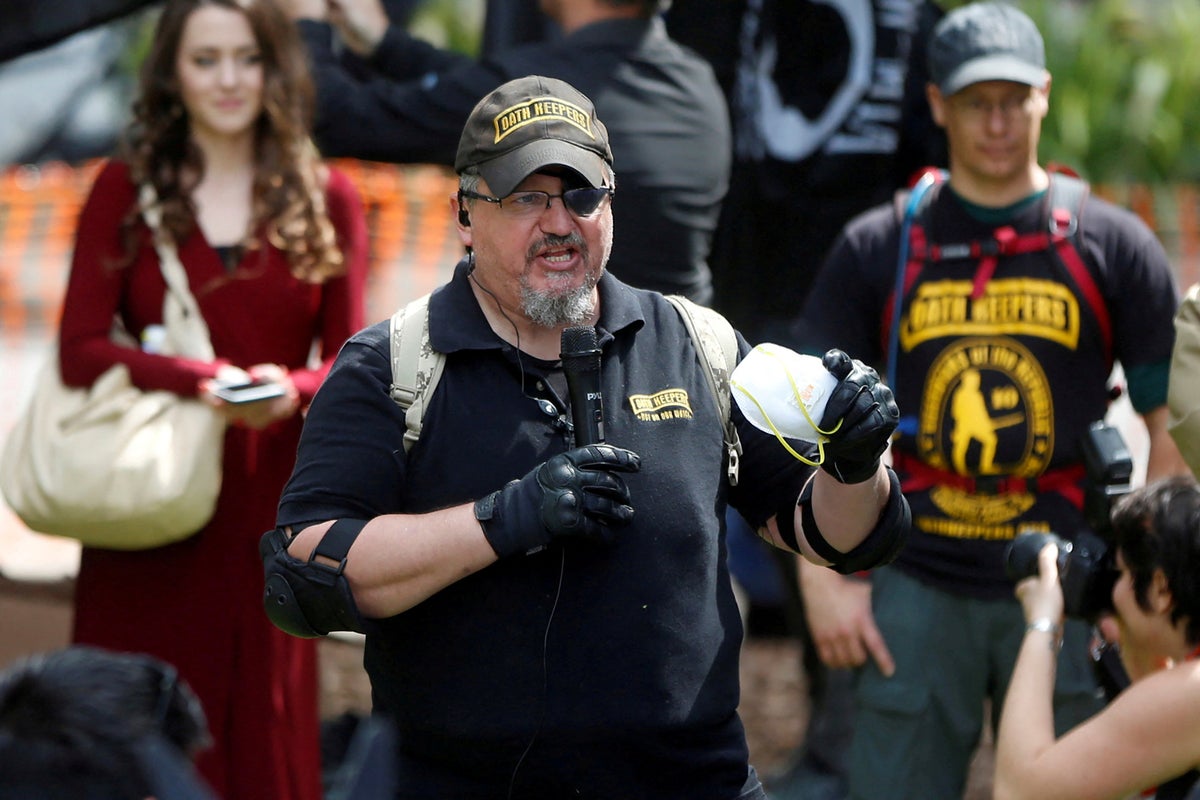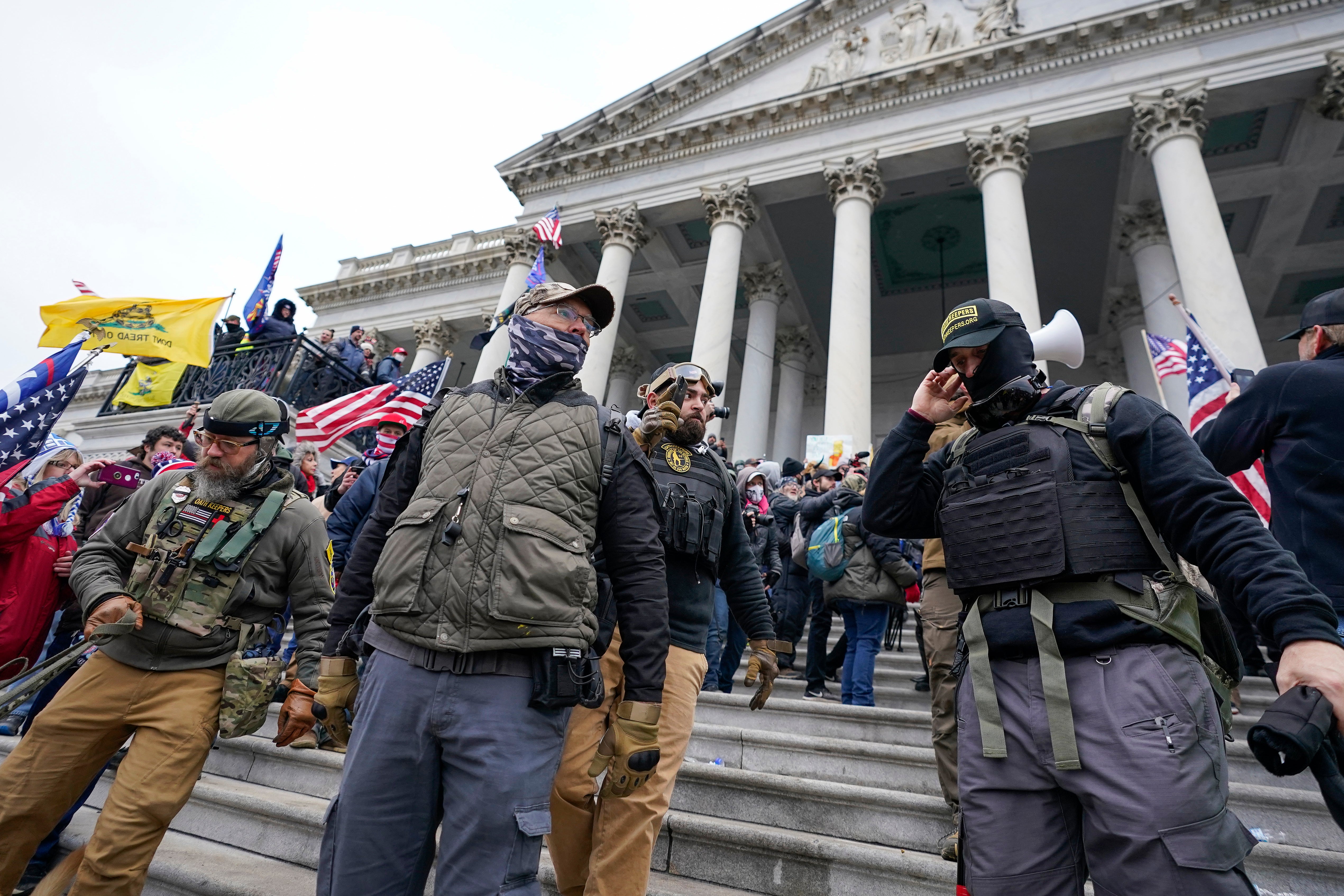
Stewart Rhodes told his supporters to prepare their “mind, body and spirit” for “civil war” in the aftermath of the 2020 presidential election, an election he falsely believes was “unconstitutional” and “stolen” from Donald Trump.
On 29 November, Rhodes and co-defendant Kelly Meggs were found guilty of seditious conspiracy against the United States. They face up to 20 years in prison.
In the weeks after Election Day in 2020, members of the far-right anti-government militia group that Rhodes founded spent weeks plotting a violent response, then assembled a “quick reaction force” for 6 January, 2021, when the Oath Keepers and their allies had planned to forcibly disrupt a joint session of Congress and join a riot fuelled by the former president’s baseless conspiracy theories.
After several members breached the halls of the US Capitol that day, shouting out “this is our f****** house” and “we took the f****** Capitol” as they joined the mob, Rhodes hailed them as “patriots”. He told an ally that his only regret that day was that the group wasn’t armed.
Meanwhile, he repeatedly urged then-President Trump to invoke the Insurrection Act in the hopes that his group would be called into action to battle his political enemies.
Rhodes and Meggs – who were also charged alongside Jessica Watkins, Kenneth Harrelson and Thomas Caldwell – are among the first Americans to be convicted of treason-related charges in decades, representing the biggest case yet in the sprawling criminal investigation from the US Department of Justice into the Capitol attack.
The federal jury’s verdict in Washington DC followed a nearly two-month-long trial and three days of deliberations.
All five defendants were found guilty of obstruction of an official proceeding of Congress.
Meggs and Watkins were also found guilty on conspiracy to obstruct.
Text, video and audio evidence detailed a ‘plot’ against the government
In the trial’s opening remarks, assistant US attorney Jeff Nestler told the jury that “the defendants actually made it easy for you,” laying out the prosecution’s plan to painstakingly recreate dozens of text messages and messages sent through encrypted messaging apps – as well as video and audio recordings – that spelled out exactly what the Oath Keepers were planning.
“They said it out loud and in writing,” he said.

The messages from Rhodes came within hours after polls closed in November 2020 – days before a winner in the presidential election had been declared. Rhodes called on his allies to reject a potential Biden victory, kicking off the militia leader’s campaign of amplifying unfounded election fraud claims to fuel the group’s response.
Asked for a “battle plan”, he responded with a bulleted list: “It ain’t over till it’s over … If that system declares Biden the winner I won’t recognize him as the legitimate president because of that fraud.”
Video evidence shared with the jury included footage from The Independent’s November 2020 interview with Rhodes in which he baselessly claimed Democrats “stole” the election and that Mr Biden’s presidency is “illegitimate”.
During the trial, Rhodes doubled down on his denial of the election’s outcome, telling the jury that he believed the election was “unconstitutional”.
Jurors also were shown a Facebook Live video from Oath Keepers attorney Kellye SoRelle on the day of the attack. She was arrested in August and separately charged for her actions on 6 January.
“This is what happens when the people are pissed and when they rise up,” she said, according to the video, which also shows Rhodes.
“We’ll see what’s happening. The storm,” said Ms SoRelle, an apparent reference to the QAnon conspiracy theory imagining Mr Trump leading a “storm” of retribution against his political enemies. “The storm arrived.”
Rhodes told defendants that “patriots are taking matters into their own hands” after determining that then-Vice President Mike Pence is “doing nothing,” according to messages shown to the court. Mr Pence ultimately certified the election results in the ceremonial proceedings after lawmakers re-convened at the Capitol hours after the attack.
“Patriots had sent a message,” Rhodes wrote to the group. “You ain’t seen nothing yet.”
Meggs, a leader of an Oath Keepers chapter in Florida, said “we are reloading”.
Oath Keepers planned violent subversion ‘by any means necessary’
A key government witness and former Oath Keepers member testified on 18 October that he was prepared to die and say goodbye to his family to keep the former president in office by using violence to stop Congress from certifying the 2020 presidential election.
In text messages from December 2020, James Dolan said he believed there was “no coming back” from the Capitol, and that he would consider himself “lucky” if he got “a prison sentence, tagged with treason, or a bullet”.
“I think my biggest trouble is trying to convince myself to say good bye to my family, after all they had to endure, with the likelihood of never seeing them again,” the former US Marine wrote in a message to other Florida Oath Keepers, according to messages shared with the court.
“I meant it literally,” he told the jury.
He said he wanted members of Congress to “be afraid of me”.
“If they weren’t going to, in my perspective, do the right thing, maybe they could be scared into doing the right thing,” he said.
Graydon Young, another Oath Keeper who cooperated with the government, believed he was joining a “Bastille-type moment in history” and “acting like a traitor against my own government”.
If then-President Trump refused to act, the group was prepared to “stop the certification of the election … by any means necessary,” Dolan told the court. “That’s why we brought our firearms.”
Dolan had previously pleaded guilty to one count of conspiracy and one count of obstruction of an official proceeding in September. He has testified in a separate trial involving five other Oath Keepers.
Prosecutors also presented evidence that the group sought an “alliance” with the far-right nationalist gang the Proud Boys and the Three Percenters, another anti-government militia.
Three days after then-President Trump told his supporters to join a “wild” protest on 6 January, Meggs started messaging potential allies.
“He called us all to the Capitol and wants us to make it wild!!!” he wrote in a Facebook message days before the attack.
Rhodes wanted Trump to invoke the Insurrection Act. Or take matters into his own hands
Days after 6 January, Rhodes typed a message intended for then-President Trump, calling on him to “save the republic” or “die in prison.”
That message was ultimately never delivered, but it echoed another message published on the Oath Keepers website weeks earlier on 14 December as part of his public campaign to demand Mr Trump invoke the Insurrection Act and effectively deputize Rhodes and the Oath Keepers to take up arms against a government they falsely believe had stolen the election.
“It’s better to wage it with you as Commander-in-Chief than to have you comply with a fraudulent election, leave office, and leave the White House in the hands of illegitimate usurpers and Chinese puppets,” he wrote.
He followed up with another message on 23 December, demanding that Trump “attack,” “drop the hammer” and deliver a “crushing blow” to his enemies “while they sleep, wrapped in their arrogance.”
Rhodes also instructed his allies to “get gear squared away and ready to fight”, adding that “Trump has one last chance right now to stand but he will need us and our rifles too.”
Central to the Justice Department’s case was the group’s stockpile of weapons and supplies outside Washington DC, allegedly used to evade the district’s strict gun laws in advance of a potential planned attack.
Defence attorneys did not deny the existence of the “quick reaction force” or “QRF” stash but argued instead that prosecutors were overblowing its purpose. They claimed that the cache was only to be used for defence or if the president needed the militia’s support.
A covertly recorded conversation between Rhodes and a government witness captured him saying that his “only regret” on 6 January was that he was not armed that day.
“We should have brought rifles,” he said. “We could have fixed it right then and there.”
He said he would “f****** hang” House Speaker Nancy Pelosi “from the lamppost.”







